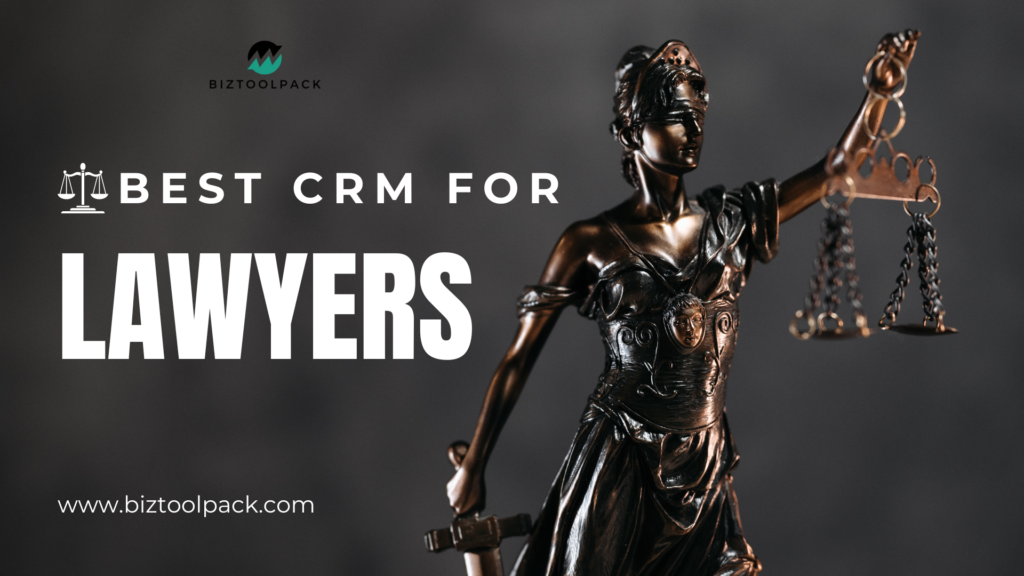Did you know that businesses using a CRM system experience a 29% increase in sales? In the competitive landscape of legal services, where client relationships and case management are paramount, leveraging the right Customer Relationship Management (CRM) system can be a game-changer. As Palash Pramanik, a seasoned CRM expert with years of experience helping businesses optimize their customer relationship strategies, I understand the unique challenges law firms face. This article aims to guide you through selecting the best CRM for lawyers, ensuring your firm not only meets but exceeds client expectations.
Choosing the right CRM is not just about managing contacts; it’s about transforming how your firm interacts with clients, manages cases, and grows your business. A well-implemented CRM can enhance customer retention, streamline operations, and provide insightful analytics that drive informed decision-making.
In this comprehensive guide, we will explore the key features to look for in a CRM tailored for law firms, review the top CRM solutions available in the market, and provide actionable steps to help you make an informed decision. Whether you’re a solo practitioner or part of a large legal team, this article will equip you with the knowledge to select a CRM that aligns with your firm’s unique needs.
What to Look for in a CRM for Your Law Firm
Scalability
As your law firm grows, so do your client base and case complexities. It’s crucial to choose a CRM that can scale alongside your business. A scalable CRM accommodates increasing data volumes, user numbers, and evolving business processes without compromising performance. Look for solutions that offer flexible pricing plans and the ability to add functionalities as needed. This ensures that your CRM remains a valuable tool, regardless of your firm’s growth trajectory.
Ease of Use
Time is of the essence in the legal profession. A CRM with an intuitive interface and straightforward onboarding process can significantly reduce the learning curve for your team. Features like drag-and-drop customization, user-friendly dashboards, and comprehensive training resources can enhance user adoption and ensure that your team can leverage the CRM’s full potential without unnecessary delays.
Customization
Every law firm has its unique workflows and requirements. A customizable CRM allows you to tailor features and functionalities to match your specific needs. Whether it’s tracking case progress, managing client communications, or automating billing processes, the ability to customize fields, modules, and workflows ensures that the CRM adapts to your firm’s operations rather than forcing you to alter your processes to fit the software.
5 Best CRM Solutions for Lawyers
Selecting the right CRM is crucial for the success of your law firm. Based on my extensive experience, here are the best CRM for lawyers that stand out in the market:
1. Zoho CRM
Zoho CRM is a customizable, cost-effective CRM solution ideal for small to large law firms. It helps lawyers manage client relationships, automate legal workflows, and track case details, making it easier to provide personalized services to clients.
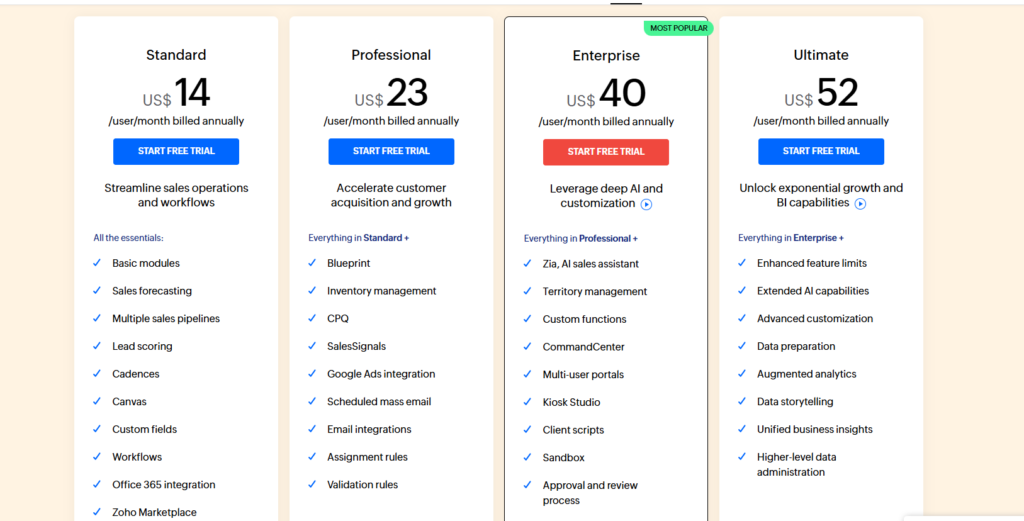
Key Features:
- Client Management: Organize and maintain detailed client information, allowing lawyers to track cases and interactions effectively.
- Workflow Automation: Automate repetitive tasks like client follow-ups, court date reminders, and case status updates.
- Document Management: Store, share, and retrieve legal documents securely within the system.
- Email & Call Integration: Track all client communications directly within the CRM for seamless case management.
- Customizable Dashboards: Tailor the CRM to display important case metrics, performance indicators, and legal tasks.
Pricing:
- Free Plan: Available for up to 3 users, limited features.
- Standard: $14/user/month – provides basic CRM functionalities and simple automation.
- Professional: $23/user/month – includes advanced automation, workflows, and reporting.
- Enterprise: $40/user/month – adds more customization, AI tools, and complex workflows.
- Ultimate: $52/user/month – offers advanced analytics, high-level customizations, and priority support.
Zoho CRM is ideal for small to mid-sized law firms that need a flexible, scalable CRM. It’s especially beneficial for firms with growing client bases that require automation and customization without high costs. Larger firms can benefit from its enterprise features, such as AI tools and detailed analytics.
2. HubSpot CRM
HubSpot CRM is a widely used, user-friendly platform designed to help businesses manage customer relationships. For lawyers, HubSpot’s focus on automation and client communication helps streamline legal processes, making client intake and follow-ups more efficient.
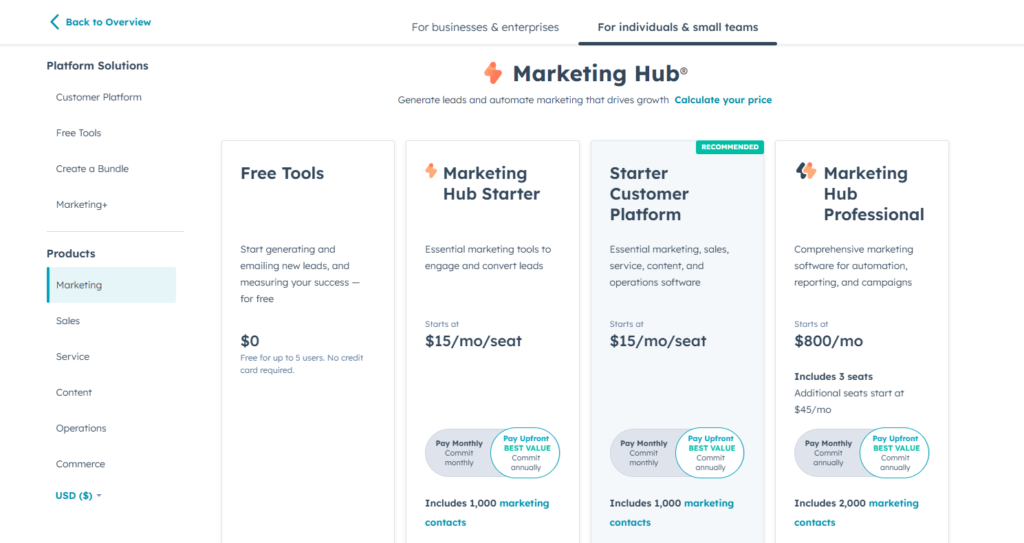
Key Features:
- Client Intake Forms: Automatically collect client information and organize it within the CRM.
- Email Tracking & Automation: Enables lawyers to track client communication and set automated follow-up reminders.
- Document Management: Store and access important legal documents in one place.
- Task Management: Helps manage deadlines, court dates, and follow-up tasks effectively.
- Analytics & Reporting: Track client cases, performance metrics, and legal team productivity.
Pricing:
- Free Plan: $0 – includes core CRM features such as contact management and email tracking.
- Starter: $15/month – adds in tools like simple automation and advanced email tracking.
- Professional: $800/month – offers more advanced automation, reporting, and team management tools.
- Enterprise: $3,600/month – includes features like custom reporting, extensive permissions, and scalable workflows.
Small to medium-sized law firms that need an easy-to-use CRM with powerful automation features, especially those focused on managing client communication and automating administrative tasks. Larger firms with complex workflows would benefit from the higher-tier plans.
3. Pipedrive CRM
Pipedrive is a sales-focused customer relationship management (CRM) tool designed to help businesses manage their sales pipelines effectively. Its intuitive interface and powerful automation features make it suitable for various industries, including legal professionals. Pipedrive provides an organized approach to tracking leads, managing client relationships, and optimizing workflows, making it an ideal choice for lawyers looking to enhance their practice management.
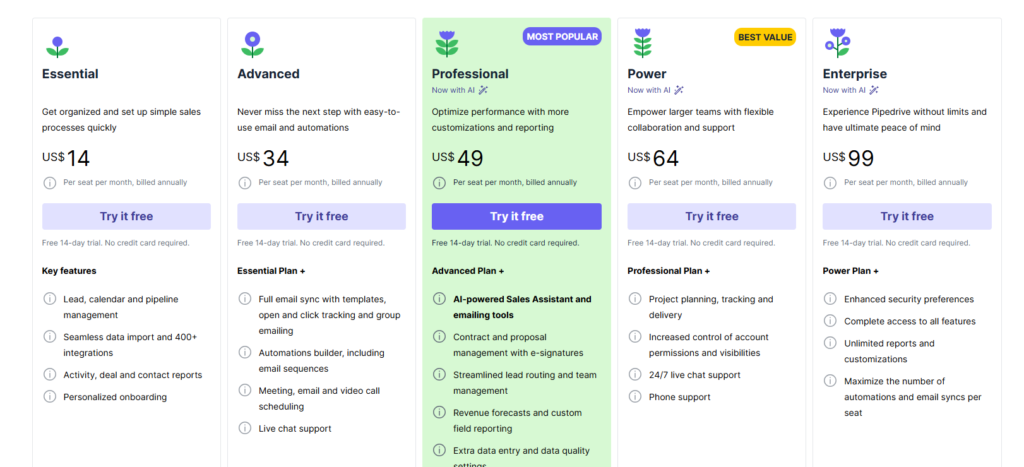
Key Features
- Sales Pipeline Management: Pipedrive allows lawyers to visualize their client interactions and manage cases through customizable pipelines, ensuring no lead is overlooked.
- Email Integration: The CRM seamlessly integrates with email platforms, enabling lawyers to send and receive emails directly from the system, thus streamlining communication with clients.
- Activity and Goal Tracking: Lawyers can set and track activities related to each case or client, ensuring deadlines are met and targets are achieved.
- Automation Features: With automation capabilities, repetitive tasks can be streamlined, allowing lawyers to focus more on client interactions rather than administrative duties.
- Reporting and Insights: Pipedrive offers detailed analytics and reporting tools, helping lawyers understand their performance and make data-driven decisions for their practice.
- Mobile Access: The mobile app provides access to client information and case updates on the go, allowing lawyers to stay connected and productive outside the office.
- Customizable Fields and Stages: Lawyers can tailor the CRM to fit their unique needs by customizing fields and stages in the pipeline according to their specific practice areas.
Pricing
- Essential Plan: $14/month per user
- Advanced Plan: $34/month per user
- Professional Plan: $49/month per user
- Power Plan: $64/month per user
- Enterprise Plan: $99/month per user
Pipedrive is particularly beneficial for solo practitioners and small to medium-sized law firms focusing on client acquisition and retention. It’s ideal for lawyers who prioritize a structured approach to managing their sales processes, including those in personal injury, family law, or any practice area requiring consistent client follow-up and case tracking.
4. Salesforce CRM
Salesforce CRM is one of the most comprehensive and widely used customer relationship management platforms in the world. It is designed to help businesses of all sizes manage their customer interactions, sales processes, and marketing efforts through a single integrated platform. For lawyers, Salesforce offers customizable solutions to enhance client management, streamline workflows, and improve overall efficiency.
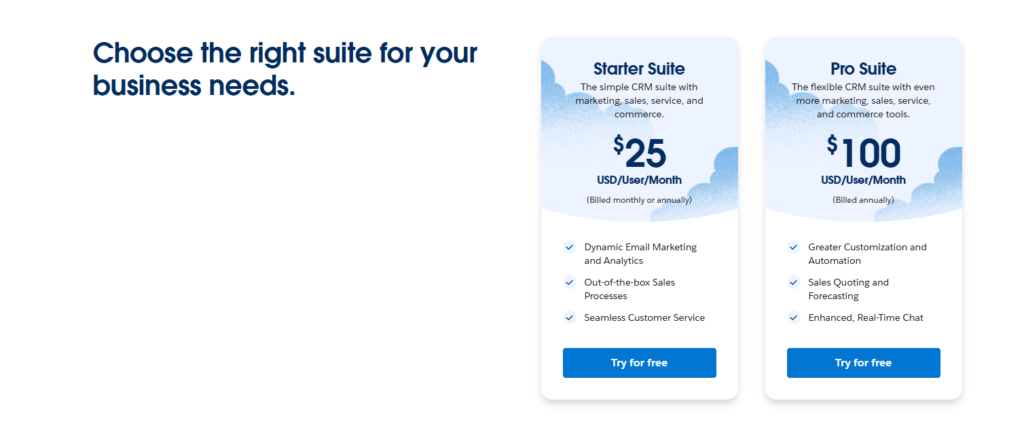
Key Features
- Comprehensive Case Management: Salesforce allows lawyers to manage cases efficiently by tracking all related documents, tasks, and communications in one place.
- Customizable Dashboards: Lawyers can create personalized dashboards that display essential metrics, case progress, and performance indicators, helping them stay organized and focused.
- Integration with Third-Party Applications: Salesforce integrates seamlessly with various third-party applications, including legal-specific tools, which enhances its functionality and allows for a more tailored experience.
- Advanced Reporting and Analytics: With robust reporting tools, lawyers can analyze case data, monitor performance, and generate insights that inform strategic decisions.
- Automation of Routine Tasks: Salesforce enables automation of repetitive tasks, such as client follow-ups and document management, freeing up lawyers to focus on higher-value activities.
- Client Portal: The CRM includes a client portal feature, allowing clients to access their case information, communicate directly with their lawyers, and receive updates, improving transparency and client satisfaction.
- Mobile Access: The Salesforce mobile app provides lawyers with access to their cases and client information on the go, ensuring they can work effectively from anywhere.
Pricing
Salesforce offers various pricing plans that can vary based on the specific needs of the law firm:
- Essentials Plan: $25/month per user
- Professional Plan: $75/month per user
- Enterprise Plan: $150/month per user
- Unlimited Plan: $300/month per user
Salesforce CRM is particularly beneficial for larger law firms and specialized practices that require robust customization and integration capabilities. It is ideal for lawyers who manage multiple cases and clients, need advanced analytics, and are looking for a comprehensive solution to improve client relationships and operational efficiency.
5. Keap CRM
Keap is a versatile customer relationship management (CRM) platform designed to help small businesses automate their marketing, sales, and client management processes. Known for its user-friendly interface, Keap streamlines operations and enhances client communication, making it an attractive option for legal professionals. It focuses on nurturing client relationships and simplifying workflow through automation.
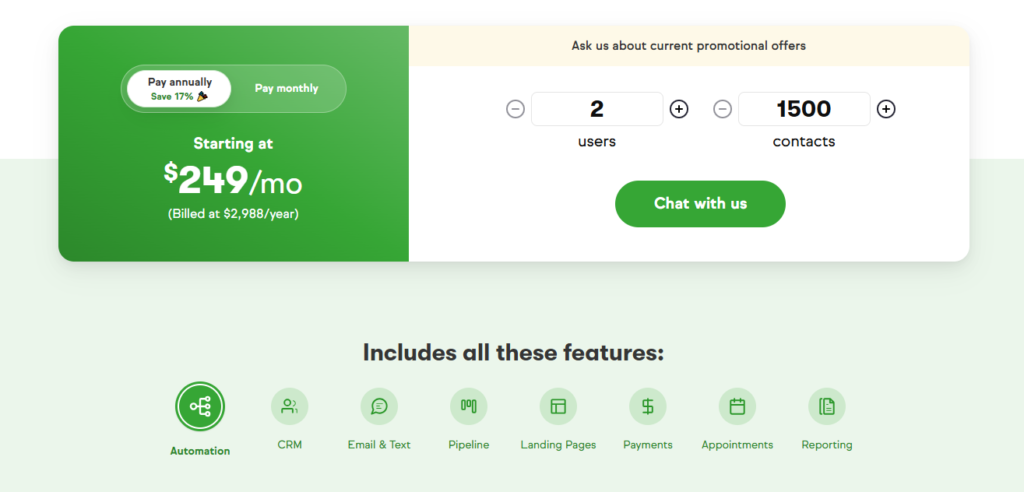
Key Features
- Client Management: Keap allows lawyers to manage all client information, case details, and communication history in one centralized system, enhancing organization and accessibility.
- Automated Workflows: The platform offers automation tools that can handle repetitive tasks like follow-up emails, appointment scheduling, and reminders, saving lawyers valuable time.
- Email Marketing Integration: Lawyers can create and send targeted email campaigns to keep clients informed about services, updates, and case-related information, fostering better communication.
- Customizable Pipelines: Keap provides customizable sales pipelines that allow lawyers to track the progress of cases and client interactions, ensuring no lead falls through the cracks.
- Appointment Scheduling: Integrated scheduling tools allow clients to book appointments directly, reducing the administrative burden on lawyers and improving client experience.
- Reporting and Analytics: Keap offers detailed reporting features to analyze client engagement, marketing effectiveness, and overall business performance, aiding in data-driven decision-making.
- Mobile Access: The mobile app ensures that lawyers can access client information and manage tasks on the go, maintaining productivity outside the office.
Pricing
- Standard Plan: $249/month for up to 1,500 contacts and 2 users. Additional fees may apply for more contacts or users.
Keap is particularly beneficial for solo practitioners and small law firms that require an all-in-one solution for client management and marketing. It is ideal for lawyers who focus on building strong client relationships and need a system to automate routine tasks, track client interactions, and enhance communication without the complexity of larger CRMs.
Which CRM is Best for Your Law Firm?
After evaluating the top contenders, Clio Manage emerges as the best CRM for lawyers. Its comprehensive suite of legal-specific features, seamless integration with other legal tools, and user-friendly interface make it an ideal choice for law firms of all sizes. Clio Manage not only streamlines case management but also enhances client communication, ensuring that your firm operates efficiently and effectively.
Use Case Recommendations
- Solo Practitioners: Pipedrive CRM offers an affordable and easy-to-use solution with essential features tailored for individual lawyers.
- Medium-Sized Firms: Keap CRM provides robust marketing automation and client management tools, making it suitable for growing firms looking to expand their client base.
- Large Firms: Salesforce for Legal offers extensive customization and scalability, perfect for large law firms with complex needs and multiple departments.
- Budget-Conscious Firms: Zoho CRM delivers a cost-effective solution with a wide range of features and integrations, ideal for firms looking to maximize value without breaking the bank.
- All-In-One Solution: HubSpot CRM is excellent for firms that want a free tier option with the ability to scale and integrate various marketing and sales tools as needed.
Next Steps
Ready to transform your law firm’s client management? Start by identifying your firm’s specific needs and priorities. Then, take advantage of free trials or schedule demos with the recommended CRM providers to see which solution aligns best with your requirements. Implementing the right CRM can significantly enhance your firm’s efficiency, client satisfaction, and overall success.
How to Choose a CRM: A Beginner’s Buying Guide for Law Firms
Selecting the best CRM for lawyers can seem daunting, especially if you’re new to CRM systems. Here’s a step-by-step guide to help you make an informed decision:
Identify Your Firm’s Needs
Begin by assessing your firm’s current processes and identifying areas that need improvement. Consider factors such as client communication, case management, billing, and reporting. Understanding your specific needs will help you narrow down CRM options that offer the features most relevant to your operations.
Evaluate Key Features
Look for CRMs that offer essential features tailored to legal practices, such as:
- Case Management: Track case progress, deadlines, and documents.
- Client Communication: Manage emails, calls, and meetings with clients.
- Billing and Invoicing: Automate billing processes and track payments.
- Document Management: Store and organize legal documents securely.
- Reporting and Analytics: Generate insightful reports to track performance and make data-driven decisions.
Consider Customization and Flexibility
Ensure that the CRM you choose can be customized to fit your firm’s workflows. This includes the ability to add or modify fields, create custom workflows, and integrate with other software tools you use, such as document management systems or accounting software.
Assess Ease of Use
A user-friendly CRM can significantly improve adoption rates within your firm. Look for solutions with intuitive interfaces, easy navigation, and comprehensive support resources. Consider requesting a demo or trial to evaluate the CRM’s usability firsthand.
Check Integration Capabilities
Your CRM should seamlessly integrate with other tools and software your firm relies on, such as email clients, document management systems, and accounting software. Integration capabilities ensure a smooth flow of information across platforms, reducing the need for manual data entry and minimizing errors.
Evaluate Pricing and ROI
Compare the pricing structures of different CRMs, considering factors such as subscription fees, additional costs for extra features, and scalability options. Assess the potential return on investment by evaluating how the CRM can help streamline operations, improve client retention, and increase revenue.
Review Customer Support
Reliable customer support is essential, especially during the initial setup and onboarding phases. Ensure that the CRM provider offers comprehensive support options, including live chat, phone support, and extensive knowledge bases or training resources.
Test with a Free Trial
Before committing, take advantage of free trials or demo versions to test the CRM’s functionality and suitability for your firm. This hands-on experience will help you determine whether the CRM meets your expectations and integrates well with your existing processes.
Conclusion
Selecting the best CRM for lawyers is a pivotal decision that can significantly impact your law firm’s efficiency, client satisfaction, and overall success. By understanding your firm’s unique needs, evaluating key features, and considering factors like scalability, ease of use, and customization, you can make an informed choice that aligns with your long-term business goals.
Remember to prioritize CRMs that offer robust legal-specific features, seamless integration capabilities, and reliable customer support. As technology continues to evolve, staying updated with the latest CRM trends and updates will ensure that your firm remains competitive and responsive to client needs.
For personalized recommendations and to explore the best CRM options tailored for your law firm, consider scheduling a demo with the providers mentioned above. Investing in the right CRM today can lead to substantial benefits and drive your firm’s growth in the years to come.
FAQs
1. Do I really need a CRM?
Absolutely. A CRM system helps manage client relationships, streamline case management, and improve communication within your firm. It centralizes client information, making it easier to track interactions, manage cases, and enhance overall efficiency, ultimately leading to better client satisfaction and increased revenue.
2. How secure is my data in a CRM?
Data security is a top priority for reputable CRM providers. Look for CRMs that offer robust security features, including data encryption, secure servers, regular backups, and compliance with industry standards like GDPR and HIPAA. Ensuring your CRM provider prioritizes data security will protect your sensitive client information from unauthorized access and breaches.
3. Can a CRM integrate with my existing tools?
Yes, most modern CRMs offer integration capabilities with a wide range of tools and software commonly used by law firms, such as email clients, document management systems, accounting software, and calendaring tools. Seamless integration ensures a smooth flow of information across platforms, reducing the need for manual data entry and minimizing errors.
4. What is the cost of implementing a CRM system?
The cost of a CRM system can vary widely depending on the provider, the features you need, and the size of your firm. Prices typically range from free basic plans to several hundred dollars per month for advanced, enterprise-level solutions. It’s essential to evaluate your budget and consider the potential return on investment when selecting a CRM to ensure you choose a solution that offers the best value for your firm.
5. How long does it take to set up a CRM?
The setup time for a CRM can vary based on the complexity of your requirements and the CRM provider you choose. Simple CRMs with basic features can be set up within a few hours, while more comprehensive systems may take several weeks to fully implement. Many providers offer onboarding assistance and support to help expedite the setup process and ensure a smooth transition for your team.
6. Can a CRM help with marketing and client acquisition?
Yes, many CRMs offer marketing automation features that can help manage campaigns, track leads, and analyze marketing performance. These tools can streamline your marketing efforts, making it easier to attract and retain clients by providing targeted communications and personalized interactions.
7. Is training required to use a CRM?
While most CRMs are designed to be user-friendly, some training is typically beneficial to ensure your team can fully utilize the system’s features. Many CRM providers offer comprehensive training resources, including tutorials, webinars, and customer support, to help you and your team get up to speed quickly and effectively.
8. What should I do if I outgrow my CRM?
If your firm outgrows your current CRM, consider upgrading to a more scalable solution that can accommodate your growing needs. Look for CRMs that offer flexible pricing plans, additional features, and robust support to ensure they can continue to support your firm as it expands.
9. Can a CRM improve client retention?
Absolutely. A CRM helps you manage and nurture client relationships by keeping track of interactions, preferences, and case progress. By providing timely and personalized communications, addressing client needs more effectively, and ensuring consistent follow-ups, a CRM can significantly enhance client satisfaction and loyalty, leading to improved retention rates.
10. Are there CRMs specifically designed for law firms?
Yes, several CRMs are specifically tailored to meet the unique needs of law firms. These legal-specific CRMs offer features such as case management, document automation, billing and invoicing, and compliance tracking, which are essential for managing legal practices effectively. Choosing a CRM designed for the legal industry ensures that the software aligns with your firm’s workflows and regulatory requirements.
I’m Palash Pramanik, an SEO and CRM expert with a deep passion for helping businesses thrive online. I specialize in driving higher search engine rankings and creating seamless customer relationship management strategies to enhance both visibility and engagement. Whether you need to boost your online presence, attract the right audience, or streamline your client interactions, I offer tailored solutions designed to meet your specific needs. My goal is to help you optimize your digital strategy, strengthen customer connections, and drive sustainable growth. Let’s work together to elevate your business to new heights!

